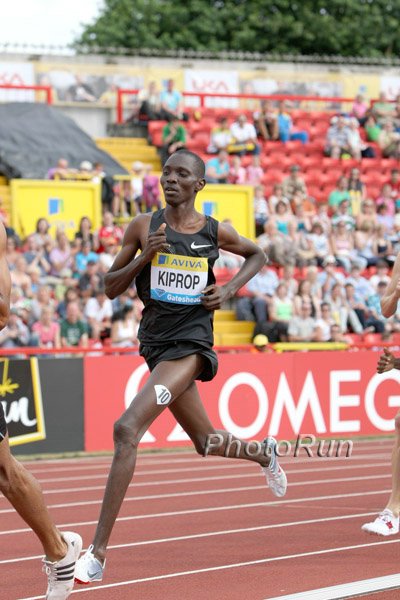Christopher McDougall's Latest Advice - Don't Be Fat
Best-selling author once again tweaks his formula for staying injury free - barefoot running isn't actually the key to Tarahumra Indians' success
In light of news, Oprah officially retires from running
McDougal: "It turns out that the most crucial component of running gently is not being fat."
By Ross McGowan
April 1, 2012
Since the 2009 release of his New York Times best seller Born to Run, Christopher McDougall has become one of the rare members of the running community with whom normal people are actually familiar. Born to Run told the story of the Tarahumara Indians, a Mexican tribe whose members have been known to run hundreds of miles without rest, and its gripping narrative effectively launched McDougall's second career as an amateur podiatrist, anthropologist, and evolutionary biologist.
Theory #1 - No Shoes Is The Key
The central question of Born to Run
was, "How in hell do the Tarahumara manage to run so far without shattering
every bone in their legs and feet?" The counterintuitive answer was that the
Tarahumara do not wear modern running shoes, which, Born to Run argued, are specifically designed to cause injury and also
possibly cancer.
The result was an explosion of casual barefoot joggers across America. Tales of reformed joggers who abandoned their deleterious Nikes and Asics in favor of the balls of their own feet rapidly multiplied as running without shoes, even on urban concrete, quickly became a sign not of poverty, but of athletic enlightenment.
In the wake of Born to Run's stratospheric success,
McDougall hit the talk show and lecture circuit, telling his growing audiences
that barefoot running was the key to preventing injuries commonly associated
with running. He also explained how barefoot running allowed homo sapiens to evolve to the point
where they could put a man on the Moon. But as the money and adulation poured
in, McDougall began to suspect that barefoot running in and of itself was not
quite the overarching cure-all he was proclaiming it to be.
Theory #2 - But You Must Have Good Form
In a November, 2011 New York Times
Magazine feature story, McDougall proposed that the true way to prevent
running injuries was not just to run barefoot, but to run efficiently. Careful
not to contradict himself, McDougall explained how running barefoot and running
efficiently go hand in hand, as running barefoot, when done properly,
necessarily causes one to run more efficiently. This also gave McDougall a tidy
explanation for the biggest hole in Born
to Run's barefoot theory - that the East Africans who beat the snot out of
slow, white people in every race imaginable every year all wear shoes. (They
just happen to run very efficiently.)
"Simply putting something different on your feet doesn't make you a gliding Tarahumara," McDougall wrote. "The ‘one best way' isn't about footwear. It's about form. Learn to run gently, and you can wear anything."
|
|
Theory #3 - Not Being Fat Is Key
Five months later, McDougall has come to realize that his formula for running
injury free needs further tweaking.
"So it turns out that running gently is easier said than done," McDougall said during his keynote lecture at the recent Brics Summit in New Delhi, India. "If we now know that running barefoot does not automatically cause one to run gently, what does? It turns out that the most crucial component of running gently is not being fat."
McDougall went on to cite a long list of running champions - including Asbel Kiprop (pictured left), Haile Gebrselassie, Kenenisa Bekele, Hicham El Guerrouj, and Sebastian Coe - none of whom are fat.
Once again, McDougall's latest proclamation has turned the running world on its ear. Within twenty-four hours of McDougall's Brics Summit address, the most famous marathoner in American history, former talk show host Oprah Winfrey, called a press conference to announce her retirement from the sport of distance running.
"I know that many of you assumed I would never run another marathon," Winfrey, visibly disappointed, said. "But since ending my talk show, I began to rededicate myself as a runner, using Chris McDougall's writings as my guide to training injury free. To learn at this juncture that, as a fat person, running without injury will not be possible is highly discouraging, which is why I am here today to announce my official retirement from the marathon."
Winfrey's retirement sent immediate shockwaves through the distance running community, and at this juncture one cannot say for sure how - or even if - the sport will progress. While the self-satisfied contributors to the LetsRun.com message board may be loath to admit it, the economic reality of the sport is that distance running is fuelled by hordes of overweight people willing to pay large sums of money to subject themselves to six hours of torture in exchange for the right to slap a "26.2" or "13.1" sticker on their rear bumper. For a sport whose visibility in the eyes of the average American was already on the wane, McDougall's latest words could prove a death knell.
More: MB: ASBEL KIPROP - "THE SKELETON RUNNER"
MB: Who's the skinniest distance runner ever?
|
|
|
|
|
|

